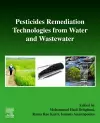
Pesticides Remediation Technologies from Water and Wastewater
3 contributors - Paperback
£110.70 was £123.00
Prof. Dr. Ioannis Anastopoulos is an Assistant Professor at the Department of Agriculture, University of Ioannina, Arta, Greece. His research is focused on the following areas at the estimation of greenhouse gas emissions from agricultural soils after receiving organic and inorganic materials, the fabrication of different adsorbents for wastewater treatment, and the use of organic amendments for soil remediation. He is an author of publications in peer-reviewed journals (> 70 articles) with more than 3000 citations. His name is also included in the 2% top world scientists for the year 2019 (Baas, Jeroen; Boyack, Kevin; Ioannidis, John P.A. (2020), “Data for "Updated science-wide author databases of standardized citation indicators", Mendeley Data, V2, DOI: 10.17632/btchxktzyw.2#file-dd0904a8-0eba-4cf3-be4a-c6092261fed5) Prof. Lima is a Professor of the Institute of Chemistry at the Federal University of Rio Grande do Sul. Prof Lima was editor of the Journal of Hazardous Materials from 2018 to 2020. He was an editor of the Journal of Environmental Chemical Engineering (JECE) from 2013 to 2018 and Editor of Special Issues of JECE from 2018 to 2019. Now, Prof. Lima is an editor of Microporous and Mesoporous Materials. He has more than 200 published papers. He has been working on the removal of toxic compounds from aqueous effluents using various kinds of adsorbents. His research group is now broadly focused on the use of biomass, in natural and/or chemically modified forms, for the removal of toxic species from industrial effluents; the development of new adsorbent materials such as organo-functionalized silica and silicates, celluloses, and carbon nanotubes; and the production of new activated carbons derived from renewable sources. Dr. Meili is a Full Professor in the Center of Technology at Federal University of Alagoas (UFAL), Maceió, Alagoas, Brazil. Prof. Meili graduated in Chemical Engineering from Federal University of Rio Grande (Brazil) and obtained his Doctorate degree in Chemical Engineering from Federal University of São Carlos (Brazil) in 2009. His areas of interest are focused on separation processes, water and wastewater treatment, and synthesis of materials. Particularly he has interest in processes of adsorption of dyes and pharmaceuticals and synthesis of biochars, clays and carbon quantum dots. He has several publications in peer-reviewed journals and he serves as editor of Water Science Technology and Journal of Applied Water Engineering and Research. Dr. Dimitrios Giannakoudakis obtained his Chemistry bachelor’s degree from Aristotle University of Thessaloniki, continuing with his first master’s degree (“Physical Chemistry & Electrochemistry of Materials) and his second (“Chemistry Teaching and New Educational Technologies). In 2012, he became a PhD candidate to the City University of New York (CUNY) focusing on “Nanotechnology and Materials Chemistry. During his PhD candidacy, he received the James Whittam Award for Research Excellence in Interfacial Phenomena (2016) and his third master’s degree. He continued as a postdoctoral researcher and adjunct tutor at CCNY (2017), at AUTh (2017-2018), and at the Institute of Physical Chemistry of Polish Academy of Sciences (IChF) in Warsaw (2018-2020). Currently, he is Assistant Professor at the IChF. His research focuses on photo/thermo/sono-catalysis, solely or in combination, in diverse environmental and energy applications and on design, functionalization, and physicochemical features characterization of nano-engineered materials/nanocomposites.